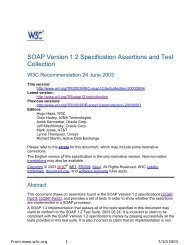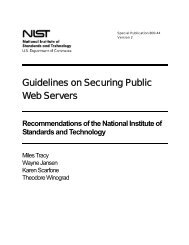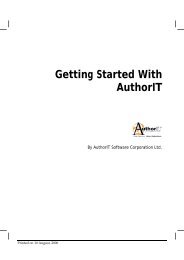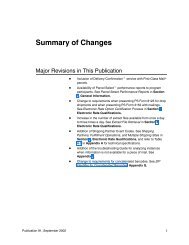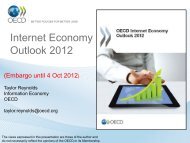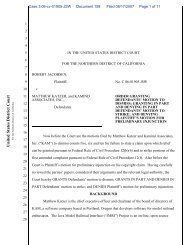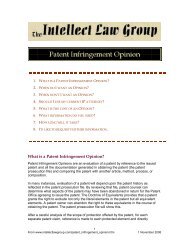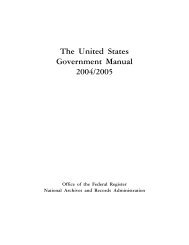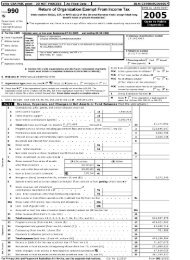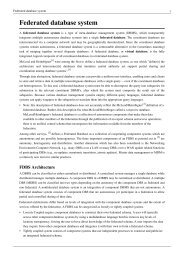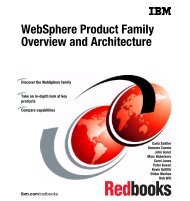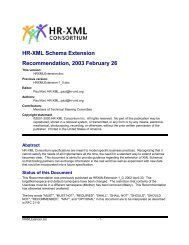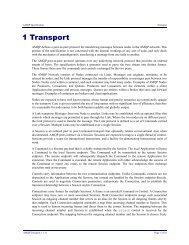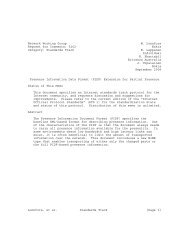Rambus: Rebuttal Brief of Appellee and Cross-Appellant Rambus Inc.
Rambus: Rebuttal Brief of Appellee and Cross-Appellant Rambus Inc.
Rambus: Rebuttal Brief of Appellee and Cross-Appellant Rambus Inc.
Create successful ePaper yourself
Turn your PDF publications into a flip-book with our unique Google optimized e-Paper software.
PUBLIC<br />
UNITED STATES OF AMERICA<br />
BEFORE THE FEDERAL TRADE COMMISSION<br />
In the Matter <strong>of</strong><br />
RAMBUS INC.,<br />
Docket No. 9302<br />
a corporation.<br />
REBUTTAL BRIEF<br />
OF APPELLEE AND CROSS-APPELLANT RAMBUS INC.<br />
MUNGER, TOLLES & OLSON LLP<br />
355 South Gr<strong>and</strong> Avenue, 35th Floor<br />
Los Angeles, California 90071-1560<br />
(213) 683-9100<br />
WILMER CUTLER PICKERING<br />
HALE AND DORR LLP<br />
2445 M Street, N.W.<br />
Washington, D.C. 20037<br />
(202) 663-6000<br />
GRAY CARY WARE & FREIDENRICH LLP<br />
1221 S. MoPac Expressway, Suite 400<br />
Austin, Texas 78746<br />
(512) 457-7125<br />
Attorneys for Respondent<br />
<strong>Rambus</strong> <strong>Inc</strong>.<br />
1021585.1
I. INTRODUCTION AND SUMMARY OF ARGUMENT<br />
Pursuant to Rule 3.52 <strong>of</strong> the Rules <strong>of</strong> Practice <strong>and</strong> the Commission’s<br />
March 18, 2004 Order, Respondent <strong>Rambus</strong> <strong>Inc</strong>. (“<strong>Rambus</strong>”) respectfully submits this<br />
rebuttal brief in support <strong>of</strong> its cross-appeal in this matter. 1<br />
In its initial brief, <strong>Rambus</strong> demonstrated that Judge McGuire had erred in<br />
not requiring Complaint Counsel to prove the essential elements <strong>of</strong> their claims by clear<br />
<strong>and</strong> convincing evidence. <strong>Rambus</strong> Initial <strong>Brief</strong> (“RIB”), pp. 134-140. In response,<br />
Complaint Counsel contend that the policies underlying the Supreme Court’s decision in<br />
Walker Process <strong>and</strong> its progeny do not apply with equal force here to compel the<br />
application <strong>of</strong> a clear <strong>and</strong> convincing burden <strong>of</strong> pro<strong>of</strong>. Complaint Counsel Reply <strong>Brief</strong><br />
(“CCRB”), pp. 101-106. They also contend that there is nothing unusual about the<br />
remedy they seek that would justify a heightened burden <strong>of</strong> pro<strong>of</strong>. Finally, Complaint<br />
Counsel dismiss as irrelevant the concerns expressed by other agencies that in a case<br />
where important issues depended on “strained <strong>and</strong> faded memories,” it would be “unfair<br />
to find a person guilty <strong>of</strong> dishonest or fraudulent conduct on a mere preponderance <strong>of</strong> the<br />
evidence.” Inquiry Into Three Mile Isl<strong>and</strong> Unit 2 Leak Rate Data Falsification, 19XX<br />
WL 910, *14 (N.R.C. 1992) (hereinafter “Leak Rate Data Falsification”). According to<br />
Complaint Counsel, “proving this case in no way depends on strained or faded<br />
memories.” CCRB, p. 106 n. 93.<br />
For the reasons set out in this rebuttal brief, Complaint Counsel are wrong<br />
on all counts.<br />
1 Pursuant to Rule 3.52(d), this brief is “limited to rebuttal <strong>of</strong> matters in the reply to<br />
[<strong>Rambus</strong>’s] cross-appeal.”<br />
1021585.1<br />
-1-
II.<br />
ARGUMENT<br />
A. The Rationale For Requiring Clear And Convincing Evidence<br />
In Walker Process Cases Is Fully Applicable Here.<br />
It is undisputed that when a plaintiff seeks to impose antitrust liability on a<br />
patent holder for bad faith enforcement <strong>of</strong> a patent or because <strong>of</strong> fraud or inequitable<br />
conduct before the PTO in obtaining the patent, the essential elements <strong>of</strong> those claims<br />
must be established by clear <strong>and</strong> convincing evidence. See Walker Process Equip., <strong>Inc</strong>.<br />
v. Food Mach. & Chem. Corp., 382 U.S. 172, 175-6 (1965); Loctite Corp. v. Ultraseal,<br />
Ltd., 781 F.2d 861, 877-78 (Fed. Cir. 1985), overruled on other grounds, Nobelpharma<br />
AB v. Implant Innovations, <strong>Inc</strong>., 141 F.3d 1059, 1068 (Fed. Cir. 1998); H<strong>and</strong>gards, <strong>Inc</strong>.<br />
v. Ethicon, <strong>Inc</strong>., 601 F.2d 986, 996 (9th Cir. 1979). Courts have consistently required this<br />
more stringent st<strong>and</strong>ard <strong>of</strong> pro<strong>of</strong> in order to “prevent frustration <strong>of</strong> patent law by the long<br />
reach <strong>of</strong> antitrust law.” H<strong>and</strong>gards, 601 F.2d at 996. 2<br />
Complaint Counsel concede, as they must, that Walker Process <strong>and</strong> its<br />
progeny require the application <strong>of</strong> a clear <strong>and</strong> convincing burden <strong>of</strong> pro<strong>of</strong> in antitrust<br />
cases where a patentee is alleged to have obtained market power by withholding material<br />
information from the PTO or is alleged to have engaged in the bad faith enforcement <strong>of</strong> a<br />
patent. CCRB, pp. 101-102. Complaint Counsel’s principal argument against the<br />
application <strong>of</strong> the heightened st<strong>and</strong>ard in this case is that they have asserted no Walker<br />
Process claims <strong>and</strong> do not allege fraud or inequitable conduct before the PTO. They<br />
argue that the policy-related concerns that led the courts to apply a heightened burden in<br />
the Walker Process line <strong>of</strong> cases are not present here. Id.<br />
Complaint Counsel err. Here, as in Walker Process <strong>and</strong> its progeny, the<br />
2 As the Federal Circuit recently observed, the “determination <strong>of</strong> which actions can cause<br />
a patentee or a patent applicant to lose the general protection <strong>of</strong> the patent law <strong>and</strong> to risk<br />
liability for damages is clearly an issue unique to the patent law” to be decided under<br />
Federal Circuit law. Unitherm Food Systems, <strong>Inc</strong>. v. Swift-Eckrich, <strong>Inc</strong>., ___ F.3d ___,<br />
2004 U.S. App. LEXIS 14274 at *41 (Fed. Cir., July 12, 2004) (emphasis added).<br />
1021585.1<br />
-2-
plaintiff alleges that the patentee’s failure to disclose material information resulted in its<br />
obtaining monopoly power in a market – here, the DRAM market – that it otherwise<br />
would not have achieved. Here, as in Walker Process <strong>and</strong> its progeny, the plaintiff<br />
alleges that the patentee’s use <strong>of</strong> the courts to enforce its patents was part <strong>of</strong> an<br />
“anticompetitive scheme” to monopolize a market. Here, as in those cases, the crux <strong>of</strong><br />
the anticompetitive conduct alleged involves a failure to disclose material patent-related<br />
information <strong>and</strong> a subsequent effort to enforce one’s patents. 3<br />
Counsel should be held to a heightened burden <strong>of</strong> pro<strong>of</strong> in this case.<br />
Accordingly, Complaint<br />
B. The Remedy Sought Here Should Also Compel The Adoption<br />
Of A Heightened Burden Of Pro<strong>of</strong><br />
It is not just the close analogy to the theory <strong>of</strong> liability addressed in Walker<br />
Process <strong>and</strong> its progeny that leads to the need for a heightened burden here. As <strong>Rambus</strong><br />
explained in its opening brief, the remedy sought in this case is also virtually identical to<br />
that sought in those cases. RIB, pp. 139-140. In this case, Complaint Counsel seek an<br />
order barring <strong>Rambus</strong> from asserting its statutory <strong>and</strong> Constitutional rights <strong>of</strong> access to<br />
the federal courts to protect its valid patents. Complaint Counsel’s Proposed Order,<br />
pp. 1-3. While such a remedy would conflict with both the relevant case law <strong>and</strong> the<br />
record evidence (see RIB, pp. 128-133), the fact that the remedy is sought necessarily<br />
affects the burden <strong>of</strong> pro<strong>of</strong>.<br />
Complaint Counsel cite numerous cases for the proposition that the<br />
preponderance st<strong>and</strong>ard typically governs in FTC enforcement actions. CCRB, pp. 101-<br />
104. <strong>Rambus</strong> agrees. But none <strong>of</strong> the cases cited by Complaint Counsel that were<br />
decided after Walker Process involved an attempt to strip a patent holder <strong>of</strong> its rights <strong>of</strong><br />
3 While Complaint Counsel refer to an “overall scheme to monopolize technology<br />
markets by subverting an open st<strong>and</strong>ards process,” they cannot dispute that the principal<br />
alleged means <strong>of</strong> the so-called “subversion” was <strong>Rambus</strong>’s purported failure to disclose<br />
patent-related information. Complaint, 2, 79-80.<br />
1021585.1<br />
-3-
access to the courts. See, e.g., In the Matter <strong>of</strong> Washington Crab Ass’n, 66 F.T.C. 45<br />
(1964) (monopolization case charging trade organization with engaging in threats <strong>of</strong><br />
reprisals, intimidation <strong>and</strong> physical violence in order to destroy competition in the crab<br />
<strong>and</strong> crab products market); In re Adventist Health System/West, 117 F.T.C. 224, 1994<br />
FTC LEXIS 54 (1994) (challenge to acquisition <strong>of</strong> hospitals). 4<br />
Complaint Counsel tell the Commission that there is no link between the<br />
nature <strong>of</strong> the remedy sought in the Walker Process line <strong>of</strong> cases <strong>and</strong> the burden <strong>of</strong> pro<strong>of</strong><br />
required there. As <strong>Rambus</strong> explained in its initial brief, however, the courts have<br />
recognized the right <strong>of</strong> access to the courts to be a fundamental part <strong>of</strong> the bundle <strong>of</strong><br />
rights that accompanies the issuance <strong>of</strong> a valid patent. See RIB, pp. 3-4, citing CVD, <strong>Inc</strong>.<br />
v. Raytheon Co., 769 F.2d 842 (1st Cir. 1985). The court in CVD, <strong>Inc</strong>. observed that in<br />
order to protect “the federal interests in patent law enforcement <strong>and</strong> the free access to the<br />
courts,” the courts in cases raising Walker Process <strong>and</strong> H<strong>and</strong>gards allegations have<br />
required “‘clear <strong>and</strong> convincing evidence’ <strong>of</strong> fraud in asserting or pursuing patent<br />
infringement claims.” CVD, <strong>Inc</strong>., 769 F.2d at 849.<br />
Moreover, in other types <strong>of</strong> cases where, as here, a plaintiff argues that<br />
access to the courts should be restricted as a remedy for misconduct, the courts have<br />
regularly held that the misconduct must be proven by clear <strong>and</strong> convincing evidence.<br />
See, e.g., Livingstone v. North Belle Vernon Borough, 91 F.3d 515, 535-6 (3d Cir. 1996)<br />
4 Complaint Counsel do cite to a case involving patent enforcement rights that was<br />
decided prior to Walker Process. In In The Roberts Co., 56 F.T.C. 1569, 1960 FTC<br />
LEXIS 226 (1960), the Commission addressed a price-fixing conspiracy between two<br />
manufacturers <strong>of</strong> carpet tools <strong>and</strong> their licensees. One <strong>of</strong> the means <strong>of</strong> enforcing the<br />
conspiracy was to threaten non-licensees with sham patent infringement suits. Id. at *92-<br />
3. The remedy ordered by the Commission – that the respondent not threaten suits<br />
against competitors “who have not practiced the invention claimed by the patent,” id. at<br />
*95 – was far less draconian than that sought here, <strong>and</strong> it is undisputed in this case that<br />
DRAM manufacturers do use <strong>Rambus</strong>’s patented inventions. Roberts is thus irrelevant.<br />
In any event, it pre-dates Walker Process <strong>and</strong> its progeny.<br />
1021585.1<br />
-4-
(holding that where a public <strong>of</strong>ficial or entity argues for dismissal <strong>of</strong> a § 1983 claim on<br />
the ground that the plaintiff had orally agreed not to pursue such claims in exchange for<br />
the dismissal <strong>of</strong> criminal charges against her, the voluntary nature <strong>of</strong> such agreements<br />
must be established by clear <strong>and</strong> convincing evidence, in light <strong>of</strong> the Constitutional<br />
nature <strong>of</strong> “the right <strong>of</strong> access to the courts. . . .”); Shepherd v. American Broadcasting<br />
Companies, <strong>Inc</strong>., 62 F.3d 1469, 1477-8 (D.C. Cir. 1995) (holding that before a case can<br />
be dismissed on the basis <strong>of</strong> litigation misconduct, the court must find clear <strong>and</strong><br />
convincing evidence <strong>of</strong> such misconduct); Aoude v. Mobil Oil Corp., 892 F.2d 1115,<br />
1118-9 (1st Cir. 1989) (same). See also Lindahl v. Office <strong>of</strong> Personnel Mgmt., 470 U.S.<br />
768, 778-9, 105 S.Ct. 1620, 1626-7 (1985) (holding that access to the courts to challenge<br />
final agency action should only be restricted upon a showing <strong>of</strong> clear <strong>and</strong> convincing<br />
evidence <strong>of</strong> Congress’s intent to enact such restrictions).<br />
As these cases demonstrate, the nature <strong>of</strong> the remedy sought by Complaint<br />
Counsel means that they should be required to prove the essential elements <strong>of</strong> their<br />
claims by clear <strong>and</strong> convincing evidence.<br />
C. The Nature Of The Claims And Of The Evidence Offered To Support<br />
Them Also Demonstrate The Need For A Heightened Burden Of Pro<strong>of</strong>.<br />
In its initial brief <strong>and</strong> in its briefs to Judge McGuire, <strong>Rambus</strong> also argued<br />
that “the nature <strong>of</strong> the claims alleged <strong>and</strong> the evidence <strong>of</strong>fered to support <strong>and</strong> rebut them”<br />
should lead to a heightened burden <strong>of</strong> pro<strong>of</strong> on the part <strong>of</strong> Complaint Counsel. RIB,<br />
p. 140, citing Leak Rate Data Falsification, 19XX WL 910 at *14 (holding that where an<br />
agency’s examination <strong>of</strong> events comes well after the relevant events transpired, <strong>and</strong><br />
where the resolution <strong>of</strong> important issues “depends on strained <strong>and</strong> faded memories,” it<br />
would be “unfair to find a person guilty <strong>of</strong> dishonest or fraudulent conduct on a mere<br />
preponderance <strong>of</strong> the evidence.”).<br />
Complaint Counsel make two arguments in response. First, they contend<br />
that FTC actions “are not bound by a statute <strong>of</strong> limitations.” CCRB, p. 106 n.93. This<br />
1021585.1<br />
-5-
argument misses the point, since <strong>Rambus</strong> has never contended that this action is barred<br />
by a statute <strong>of</strong> limitations. Moreover, the absence <strong>of</strong> a limitations period actually<br />
underscores, not diminishes, the need for heightened scrutiny <strong>of</strong> the plaintiff’s evidence<br />
in a case like this one. It is black-letter law that statutes <strong>of</strong> limitations play an important<br />
role in eliminating cases that depend upon “strained <strong>and</strong> faded memories.” See generally<br />
Areeda, Hovenkamp & Blair, II Antitrust Law 320 at 205 (2d ed. 2000) (observing that<br />
statutes <strong>of</strong> limitations serve “to relieve courts <strong>and</strong> parties from ‘stale’ claims where the<br />
best evidence may no longer be available.”). As the Areeda treatise notes:<br />
“[r]epose is especially valuable in antitrust, where tests <strong>of</strong> legality<br />
are <strong>of</strong>ten vague, where many business practices can be<br />
simultaneously efficient <strong>and</strong> beneficial to consumers but also<br />
challengeable as antitrust violations, where liability doctrines<br />
change <strong>and</strong> exp<strong>and</strong>, [<strong>and</strong> where] relevant evidence may disappear<br />
over time. Antitrust liability depends not only on the parties’ acts<br />
but also on many surrounding circumstances, including the<br />
behavior <strong>of</strong> rival firms <strong>and</strong> general market conditions – matters<br />
that may be hard to reconstruct long afterward.”<br />
Id. In sum, Complaint Counsel’s argument that the absence <strong>of</strong> a statute <strong>of</strong> limitations<br />
somehow “undermines” the need for heightened scrutiny <strong>of</strong> the evidence is contrary to<br />
logic <strong>and</strong> law.<br />
Complaint Counsel’s second, <strong>and</strong> related, argument is that unlike the Leak<br />
Rate Data Falsification case, their case “in no way depends on strained or faded<br />
memories” <strong>and</strong> relies instead on “contemporaneous record evidence.” CCRB, p. 106<br />
n.93. As a result, they say, a heightened burden <strong>of</strong> pro<strong>of</strong> is unnecessary.<br />
This argument is demonstrably false. On issue after issue, it is <strong>Rambus</strong> that<br />
has relied upon the contemporaneous written evidence, <strong>and</strong> it is Complaint Counsel who<br />
have relied upon the “faded memories” <strong>of</strong> interested witnesses. A few <strong>of</strong> these critical<br />
1021585.1<br />
-6-
issues – <strong>and</strong> the parties’ respective evidentiary positions on those issues – are set out<br />
below.<br />
Issue No. 1:<br />
Did JEDEC require disclosure <strong>of</strong> patents<br />
<strong>and</strong>/or patent applications, or was disclosure<br />
instead voluntary?<br />
<strong>Rambus</strong> Evidence<br />
<strong>Rambus</strong> relies in part upon the January 1996<br />
comment letter to the FTC, signed by EIA<br />
General Counsel John Kelly, stating that the<br />
EIA “encourage[s]” the “voluntary disclosure<br />
<strong>of</strong> patents that relate to the st<strong>and</strong>ards in<br />
work.” RX 669 at 2 (emphasis added).<br />
<strong>Rambus</strong> also cites to the minutes <strong>of</strong> the<br />
February 2000 meeting <strong>of</strong> the JEDEC Board<br />
<strong>of</strong> Directors, which state that the disclosure <strong>of</strong><br />
patent applications is “not required under<br />
JEDEC bylaws,” RX 1570 at 13, <strong>and</strong> to an<br />
email a few days after the Board meeting by<br />
JEDEC Secretary Ken McGhee stating that<br />
the “BoD” had discussed the disclosure issue<br />
<strong>and</strong> had determined that the disclosure <strong>of</strong><br />
patent applications went “one step beyond”<br />
the requirements <strong>of</strong> the patent policy.<br />
RX 1582 at 1.<br />
Complaint Counsel Response<br />
Complaint Counsel respond by pointing<br />
to the trial testimony <strong>of</strong> General Counsel<br />
Kelly that the phrase “voluntary<br />
disclosure <strong>of</strong> patents” did not mean that<br />
disclosure was voluntary, but instead<br />
meant that JEDEC membership was<br />
voluntary. Kelly, Tr. 2017.<br />
In response, Complaint Counsel rely<br />
generally on the trial testimony <strong>of</strong><br />
various former JEDEC representatives<br />
about their recollections <strong>of</strong> the patent<br />
policy. They have also asked the<br />
Commission to allow the untimely<br />
admission <strong>of</strong> deposition testimony from<br />
Messrs. Rhoden, Kelly <strong>and</strong> McGhee that<br />
the February 2000 Board minutes, <strong>and</strong><br />
McGhee’s contemporaneous email, are<br />
simply mistaken. CCRB, pp. 22-27, 36-<br />
37.<br />
1021585.1<br />
-7-
Issue No. 2:<br />
Did JEDEC leaders act as if the disclosure <strong>of</strong><br />
patents <strong>and</strong> patent applications was required?<br />
<strong>Rambus</strong> Evidence<br />
<strong>Rambus</strong> relies in part upon JEDEC minutes<br />
that show that JC 42.3 Committee Chairman<br />
Gordon Kelley had announced several times<br />
that his company (IBM) would not disclose<br />
patents or applications <strong>and</strong> had stated that it is<br />
“up to the user <strong>of</strong> the st<strong>and</strong>ard to discover<br />
which patents apply,” <strong>and</strong> upon JEDEC<br />
minutes <strong>and</strong> “patent tracking lists” that show<br />
that after Kelly made these announcements,<br />
IBM disclosed no further patents or<br />
applications. JX 15 at 6; JX 18 at 8; JX 8 at<br />
14-21; JX 19 at 17-23; JX 20 at 15-18; JX 21<br />
at 14-18; JX 25 at 18-26; JX 26 at 15-24;<br />
JX 27 at 20-25; JX 28 at 12-18.<br />
<strong>Rambus</strong> also relies upon documents showing<br />
that JEDEC Chairman Desi Rhoden was the<br />
named inventor on a patent application that<br />
covered a JEDEC st<strong>and</strong>ard in its entirety, <strong>and</strong><br />
upon JEDEC minutes that contain no<br />
indication that either he or his co-inventors<br />
had disclosed the patent application to JEDEC<br />
until five years after the st<strong>and</strong>ard was<br />
Complaint Counsel Response<br />
Complaint Counsel respond by pointing<br />
to oral testimony by Mr. Kelley <strong>and</strong> by<br />
JEDEC Chairman Rhoden that the<br />
JEDEC minutes were inaccurate <strong>and</strong> that<br />
Kelley had said only that he could not<br />
guarantee that all relevant IBM patents<br />
had been disclosed. Rhoden, Tr. 589-90;<br />
Kelley, Tr. 2471-3.<br />
In response, Complaint Counsel point to<br />
oral testimony by Mr. Rhoden claiming<br />
that the application had been disclosed.<br />
CCRB, p. 37; Rhoden, Tr. 1242.<br />
1021585.1<br />
-8-
<strong>Rambus</strong> Evidence<br />
Complaint Counsel Response<br />
adopted. <strong>Rambus</strong> Proposed Findings (“RPF”)<br />
243-247; JX 26 at 10; JX 26 at 111; JX 41 at<br />
22-24; RX 2086 at 1; RX 2099-43 at 250.<br />
Issue No. 3:<br />
Was <strong>Rambus</strong> A Member Of JEDEC At The<br />
Time That JEDEC’s DDR St<strong>and</strong>ardization<br />
Process Began?<br />
<strong>Rambus</strong> Evidence<br />
<strong>Rambus</strong> relies in part upon a March 1998<br />
email by JEDEC Chairman Rhoden to the<br />
JC 42.3 committee that was intended to<br />
“recap what has transpired with DDR” <strong>and</strong><br />
that states that there was a “lot <strong>of</strong> private <strong>and</strong><br />
independent work outside <strong>of</strong> JEDEC for most<br />
<strong>of</strong> 1996 (here is where we missed a good<br />
opportunity to start early).” CX 375 at 1-2<br />
(emphasis added). The email then states that<br />
the first DDR proposal at JEDEC was in<br />
December 1996, which is well after <strong>Rambus</strong><br />
had withdrawn from JEDEC. Id. <strong>Rambus</strong><br />
also cites to an April 1997 presentation by<br />
Mr. Rhoden that states that “DDR [was]<br />
introduced in JEDEC in December 1996.”<br />
RX 911 at 3; RPF 407.<br />
Complaint Counsel Response<br />
In response, Complaint Counsel point to<br />
the oral testimony <strong>of</strong> Chairman Rhoden,<br />
who testified that it was only the name<br />
“DDR” that was introduced at JEDEC in<br />
December 1996. Rhoden, Tr. 1198.<br />
1021585.1<br />
-9-
<strong>Rambus</strong> will not belabor the point in this rebuttal brief. It is apparent that<br />
Complaint Counsel’s case does depend upon the recollections <strong>of</strong> JEDEC members <strong>and</strong><br />
other witnesses about events that occurred over a decade ago. As a consequence, <strong>and</strong><br />
because it would be “unfair to find a person guilty <strong>of</strong> dishonest or fraudulent conduct on a<br />
mere preponderance <strong>of</strong> the evidence” in a case that “depends on strained <strong>and</strong> faded<br />
memories,” Leak Rate Data Falsification, 19XX WL 910 at *14, Complaint Counsel<br />
should be held to a heightened burden <strong>of</strong> pro<strong>of</strong>.<br />
III.<br />
CONCLUSION<br />
Given the conflicting statutory interests involved, given the nature <strong>of</strong> the<br />
claims alleged <strong>and</strong> the evidence <strong>of</strong>fered to support <strong>and</strong> rebut them, <strong>and</strong> given the<br />
fundamental nature <strong>of</strong> the rights that would be lost were the proposed remedy ever<br />
implemented, Complaint Counsel should bear the burden <strong>of</strong> proving the essential<br />
elements <strong>of</strong> their claims by clear <strong>and</strong> convincing evidence.<br />
1021585.1<br />
-10-
Dated: July 16, 2004<br />
/s/<br />
Gregory P. Stone<br />
Steven M. Perry<br />
Peter A. Detre<br />
MUNGER, TOLLES & OLSON LLP<br />
355 South Gr<strong>and</strong> Avenue, 35th Floor<br />
Los Angeles, California 90071-1560<br />
(213) 683-9100<br />
A. Douglas Melamed<br />
Kenneth A. Bamberger<br />
WILMER CUTLER PICKERING<br />
HALE AND DORR LLP<br />
2445 M Street, N.W.<br />
Washington, D.C. 20037<br />
(202) 663-6000<br />
John M. Guaragna<br />
GRAY, CARY, WARE & FREIDENRICH LLP<br />
1221 S. MoPac Expressway, Suite 400<br />
Austin, Texas 78746<br />
(512) 457-7125<br />
Attorneys for Respondent <strong>Rambus</strong> <strong>Inc</strong>.<br />
1021585.1
UNITED STATES OF AMERICA<br />
BEFORE THE FEDERAL TRADE COMMISSION<br />
)<br />
In the Matter <strong>of</strong> )<br />
) Docket No. 9302<br />
RAMBUS INCORPORATED, )<br />
a corporation. )<br />
)<br />
CERTIFICATE OF SERVICE<br />
I, Kenneth A. Bamberger, hereby certify that on July 16, 2004, I caused a true <strong>and</strong> correct<br />
copy <strong>of</strong> the <strong>Rebuttal</strong> <strong>Brief</strong> <strong>of</strong> <strong>Appellee</strong> <strong>and</strong> <strong>Cross</strong>-<strong>Appellant</strong> <strong>Rambus</strong> <strong>Inc</strong>. to be served on the<br />
following persons by h<strong>and</strong> delivery:<br />
Hon. Stephen J. McGuire<br />
Richard B. Dagen, Esq.<br />
Chief Administrative Law Judge<br />
Assistant Director<br />
Federal Trade Commission<br />
Bureau <strong>of</strong> Competition<br />
Room H-112<br />
Federal Trade Commission<br />
600 Pennsylvania Avenue, N.W. 601 New Jersey Avenue, N.W.<br />
Washington, D.C. 20580 Washington, D.C. 20001<br />
Donald S. Clark, Secretary<br />
Malcolm L. Catt, Esq.<br />
Federal Trade Commission<br />
Attorney<br />
Room H-159<br />
Federal Trade Commission<br />
600 Pennsylvania Avenue, N.W. 601 New Jersey Avenue, N.W.<br />
Washington, D.C. 20580 Washington, D.C. 20001<br />
Kenneth A. Bamberger
UNITED STATES OF AMERICA<br />
BEFORE THE FEDERAL TRADE COMMISSION<br />
____________________________________<br />
)<br />
In the Matter <strong>of</strong> )<br />
) Docket No. 9302<br />
RAMBUS INC., )<br />
a corporation, )<br />
____________________________________)<br />
CERTIFICATION<br />
I, Kenneth A. Bamberger, hereby certify that the electronic copy <strong>of</strong> <strong>Rebuttal</strong> <strong>Brief</strong> <strong>of</strong> <strong>Appellee</strong><br />
<strong>and</strong> <strong>Cross</strong>-<strong>Appellant</strong> <strong>Rambus</strong> <strong>Inc</strong>. accompanying this certification is a true <strong>and</strong> correct copy <strong>of</strong><br />
the paper version that is being filed with the Secretary <strong>of</strong> the Commission on July 16, 2004 by<br />
other means.<br />
Kenneth A. Bamberger<br />
July 16, 2004



